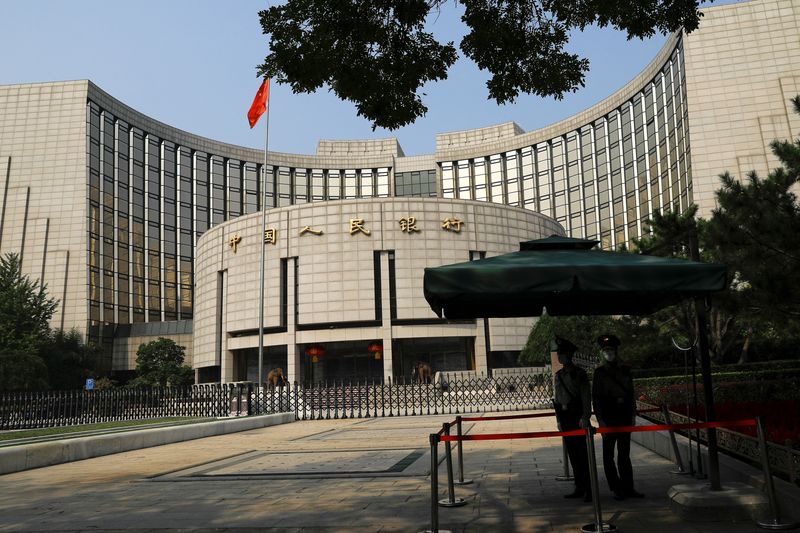SHANGHAI/SINGAPORE (Reuters) - China's central bank ramped up liquidity injection but kept the interest rate unchanged when rolling over maturing medium-term policy loans on Friday, matching market expectations.
Despite the steady policy rate, market participants widely expect China to maintain an accommodative monetary stance and possibly unleash further stimulus including interest rate cuts and reserve requirement ratio reductions into the new year to boost the economy.
The People's Bank of China (PBOC) said it was keeping the rate on 1.45 trillion yuan ($203.97 billion) worth of one-year medium-term lending facility (MLF) loans to some financial institutions unchanged at 2.50% from the previous operation.
With 650 billion yuan worth of MLF loans set to expire this month, the operation resulted in a net 800 billion yuan fresh fund injection into the banking system in December, booking the biggest monthly increase on record.
The central bank said Friday's loan operation was meant to "keep banking system liquidity reasonably ample" to counteract short-term factors, including government bond issuance, and appropriately increase mid- to long-term base money supply, according to an online statement.
Over recent months, China has started to unleash fresh fiscal stimulus to shore up the economy.
In a surprise move, Beijing in late October approved 1 trillion yuan of sovereign bond issuance for this year - its first such budget deficit expansion in a fiscal year in 23 years - and passed a bill to allow local governments to frontload part of their 2024 bond quotas.
Twenty-nine, or 91%, of 32 market watchers polled by Reuters this week expected the central bank to keep the borrowing cost of the MLF loans unchanged.
And 26 of all respondents predicted that the central bank would inject fresh funds to exceed the maturity.
"After the continuous large-scale liquidity injection through MLF loans, the cost of financing has been raised. And we think the timing is mature for a reserve requirement ratio (RRR) cut," said Xing Zhaopeng, senior China strategist at ANZ.
Xing expects a cut in the reserve requirement ratio could be delivered before the Lunar New Year, which falls in mid-February next year.
Others echoed the view, with markets widely expecting China's central bank to continue easing monetary policy next year to aid the economy.
"We maintain that policymakers in China will ease policy further to try to achieve next year's ambitious growth target, and that fiscal policy will do the heavy lifting of supporting growth in 2024," analysts at Goldman Sachs said in a note.
"While we expect further easing to include more RRR and policy rate cuts, recent PBOC communications suggest that policymakers may focus more on structural lending tools than aggregate instruments to support the economy over the near term."
Odds of an interest rate reduction have increased, as deflationary pressure has translated into higher real interest rates in China, analysts said.
Consumer prices fell the fastest in three years in November, while factory-gate deflation deepened.

"To accommodate the sizable government bond issuance ahead and mitigate the lingering deflation pressures, we expect PBOC to ease monetary policy further by cutting the MLF policy rate by 10-20 basis points and RRR by 25-50 bp in the coming year, together with more use of other liquidity facilities," said Wang Tao, chief China economist at UBS.
($1 = 7.1088 Chinese yuan)